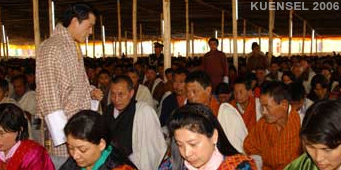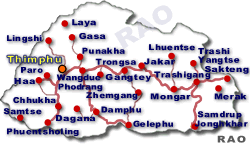| You are here: | Home > Bhutan > Topics > Politics > Constitution > Public consultations | Search |
 |
| Bhutan - Politics |
| Bhutan's new Constitution |
|
|
| Chukha dzongkhag discusses the Constitution |
|
|
29 March 2006
 |
|
More than 7,000 people of Chukha, who had gathered in Phuentsholing, received His Royal Highness the Crown Prince, Trongsa Penlop Jigme Khesar Namgyel Wangchuck, with a traditional chipdrel ceremony.
During the formal discussions the people asked for the removal of the section that required the Druk Gyalpo to abdicate at the age of 65 years. They pointed out that there was no such precedence in any monarchy nor in any country in the world.
 |
|
They had heard His Majesty speak of his vision for the country and how he would work to fulfill the aspirations of the people. And they had been witnesses to the progress and transformation brought about by such a young leader. The people of Chukha, therefore, also looked forward with hope and confidence at the young Crown Prince.
His Royal Highness said that although the King had, from a young age, always worked in the interests of the people, the announcement that His Majesty would resign in 2008 had initially been a deep shock.
On reflection His Royal Highness had come to realise that, throughout the 33 years of his reign, His Majesty had worked towards this� the complete and careful devolution of power to the people. Local governments and decision-making bodies, elections and participatory planning were all steps to train the people to assume their responsibilities that would come with the adoption of the Constitution.
His Royal Highness related a personal moment with His Majesty in 2003, during the military operations against Indian militants in the south, when His Majesty had said: "As a Crown Prince your duty is not to serve the King. It is always to serve the people". His Royal Highness said he had felt then, and still felt now, that serving His Majesty was the same as serving the country. He said that, as His Majesty places the country on the road to democracy, they should work with commitment to fulfill the King's vision for the nation and people.
His Royal Highness said he agreed with the people's prioritisation of culture and their desire to include it in the Constitution. It played a special role in the case of all landlocked countries, His Royal Highness said, but it was even more important for Bhutan, given the living vibrant culture and its significance in bringing about a special way of life. He said he was confident that the young Bhutanese would safeguard this priceless inheritance.
His Royal Highness explained the workings of the political parties, elections, and formation of government. His Royal Highness said that the Constitution had been drafted to prevent the ills that other countries had faced with coalition governments, instability, horse-trading and defections.
Some of the people raised their concern that, with the changes in the political system, it would become much easier for corruption to take root. Without a strong leader the political parties would take Bhutan into the same future as many failed nations.
Ultimately, His Royal Highness said, the crucial ingredient is the people. If they elected the people best able to serve their interests and that of the country, the new political system would bring immense prosperity and growth. However, if they were to shirk their responsibilities, the problems that had taken root in other countries would begin in Bhutan. The concern that the people expressed today was a good sign for the future of the country.
"It is natural to worry about something you care for but it should not become an excuse for the failure to accept and carry out one's responsibilities," said the Crown Prince. "His Majesty has complete confidence in you and so do I."
Some people said that the age limit of 25 to 65 years for candidates standing for election should be raised to allow senior retired civil servants to contest. The chief justice explained that the philosophy behind the relatively low retirement age limit for most positions was that the country would have young and dynamic officials as the country progressed and changed rapidly. Senior officials should not be able to hold on to office indefinitely. In fact His Majesty had set the example by personally commanding that the clause requiring the King to resign at 65 years should be included in the Constitution. In the case of civil servants who wished to participate in politics they could resign and do so at any time before the age limit.
His Royal Highness said that, with over 45 percent of the population under 15 years, this was an important limit. These young people had the desire to serve the country so they deserved the opportunity to fulfill their ambitions.
On Article 30, on Holders of Constitutional Offices, His Royal Highness pointed out that their appointment was quite unique. Unlike the practice of the leader of the ruling party making the recommendations for general appointments, they would be selected jointly by the Prime Minister, Speaker of the National Assembly, Chief Justice, Chairperson of the National Council, and the leader of the Opposition party. Once in office they could only be removed by parliamentary vote. This ensured that the best people would be selected and they would have the necessary independence from politics and government as well as accountability to the people.
On the final Article, Amendment, the Chief Justice explained that, in Bhutan, the King was introducing a stable democratic system despite the resistance of the people. His Majesty had always said that the "destiny of the country lies in the hands of the people". He said the drafting committee had felt that Article 2, on the Institution of Monarchy, should be inviolable but His Majesty had commanded that the people must have the power to amend any article or section in the Constitution. This was a sign of complete commitment to the people's future.
"Bhutan is a special nation built on the toil and vision of our parents - yours and mine," said the Crown Prince while concluding the discussions. "We must be proud of it and we must build upon this strong foundation so that one day our children will be proud of us."
In a special message to the young people at the meeting His Royal Highness said that, as the leaders of the next decade, it was important for them to understand the profound changes taking place and to contemplate on their own hopes for Bhutan and for themselves and work towards fulfilling them.
His Royal Highness said that, despite the successes Bhutan had enjoyed, it would take strong commitment and effort to build the new system of a democratic constitutional monarchy. His Royal Highness also expressed his confidence in the people's ability to implement the new Constitution.
Talking to Kuensel, Bhutan's National Newspaper, the people of Chukha echoed the apprehension and hopes of a population on the eve of historic change.
Some expressed their concerns over the known ills of parliamentary democracy as they themselves had seen in the local elections. They said that the royal government had taken the right action in putting those responsible for electoral corruption behind bars. "It was a good example, proving that nobody was above the law," said C B Ghalley, gup of Phuentsholing gewog.
Khaley, 51, of Barshong village, said that a parliamentary democracy would allow corruption while Kezang Wangmo, 32, of Getena believed that the poor and disadvantaged would be neglected.
The youth said they looked forward to gaining political maturity under the rule of the Crown Prince.
Dorji Lhendup, a Class XI student of Chukha higher secondary school, told Kuensel that His Royal Highness was an inspiration for the Bhutanese youth today. "His Royal Highness always emphasises the role of the Bhutanese youth wherever he goes and it is an encouragement for us to do better," he said.
"With many youth giving in to the whims of modernisation, it is very easy to be distracted these days. So the words of His Royal Highness gives us direction in life."
The people left the meeting feeling secure in the knowledge that, during the years of dramatic change that lay ahead, they could look to their King and their Crown Prince for guidance.
| This article was contributed by Kuensel, Bhutan's National Newspaper, 2002 |
| Links |
| External links |
| Bhutan's
CONSTITUTION Constitution official website |
 |
|
|
